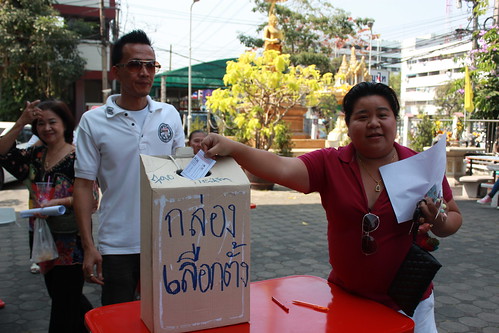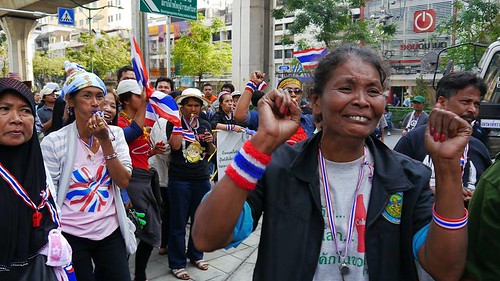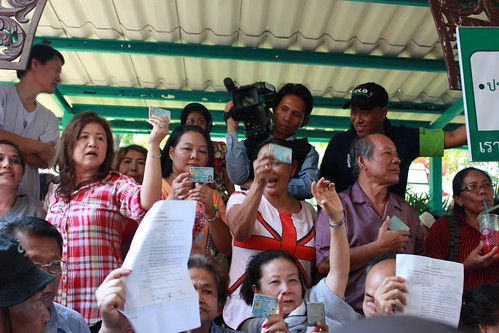Thailand’s general election has ended with some trouble spots in Bangkok and the southern provinces, where anti-government protesters caused disruption. About 10% of polling stations nationwide had to close down because ballot boxes could not be deployed in time, or election officials failed to show up.
In Bangkok, about 92.8 percent of 6,671 voting stations were undisrupted while in 9 Southern provinces, a Democrat stronghold, all stations were closed down.
Suthep Thaugsuban, leader of the anti-government protest and former Democrat MP, said prior to Sunday that the movement would not obstruct the elections, merely express opposition to the election he viewed as “illegitimate” and “corrupt”.
The demonstrators, mostly the elite, Bangkokians and people from the South, have occupied major intersections in Bangkok for almost three months, in a fight that aims to oust the Yingluck Shinawatra administration, which would most likely win this re-election, and replace it with an unelected “People’s Council.”
The chaos on Sunday followed the advance vote on Jan 26, when anti-government protesters obstructed 45 stations out of 50 in Bangkok and all in 9 provinces in the south of Thailand, resulting in 400,000 people losing their right to vote.
“They’ve been occupying intersections, closing down voting stations, and they call that democracy?” asked Gift, a Ratchathewi District resident in Bangkok who came to file a complaint at a police station after she could not vote. All 86 stations in the district were closed down due to obstruction by protesters.
Some troubled residents organized a mock polling station to express their dissatisfaction at not being able to vote. They said they would collect names, along with police records, and send those to the Election Commission.
 Ratchathewi residents stage mocking up ballot box as symbol for the votes they could not cast.
Ratchathewi residents stage mocking up ballot box as symbol for the votes they could not cast.
In Din Daeng, another district where all 175 polling stations were closed due to disruption, a few hundred angry voters protested at the police station and yelled at the police. “We want elections, we want elections!”
The authorities said the anti-government protesters had blocked its office since Saturday night, so the ballot boxes could not be distributed to stations in time before 8 am.
Pornapa Duangsuk, a 42-year-old Din Daeng resident, said with tears on her face that she has been patient all this time and waited for this day to cast her vote. “I don’t want any violence, just an election. Why can’t they just let us vote?”
Tensions between pro-election groups and anti-government demonstrators peaked on Saturday when deadly clashes between the groups left seven people injured. Political violence during the past three months has already claimed ten lives on both sides of the conflict.
The situation has prompted concerns from the EU, US and international rights groups who condemned the obstruction of voting by the protesters.
 Anti-government protesters express their opposition against the election.
Anti-government protesters express their opposition against the election.
(Photo credit: Jeanne Marie Hallacy) Although the government has declared a State of Emergency for the past month; it seems unable to take full control of the situation. The protesters still occupy the main business districts in Bangkok, while recent negotiations with a protest leader to reclaim a major government complex in the outskirts of Chaeng Wattana fell flat.
The conservative Democrat Party, who boycotted this election, filed complaints with the Ombudsman in the hope that the Constitutional Court will annul this election.
Ongart Klampaiboon, Deputy Chair of the Democrat Party, said this election is not the solution to the country’s conflict, since elections in most Southern Thailand cannot be held, so results in those areas may be biased.
He said the government ignored the Election Commission’s advice to postpone the election, because Yingluck wanted to claim a majority to legitimize her government.
 Upset voters protest the authorities who decided to shut off all polling stations in Din Daeng district.
Upset voters protest the authorities who decided to shut off all polling stations in Din Daeng district.
The request to have the election annulled, however, lacks any legal basis, said Ekachai Chainuvati, a law academic from Siam University and a member of the Assembly for the Defence of Democracy (AFDD).
But he said the politicized Constitutional Court might interpret the law in a way that gives the advantage to the royalist-backed Democrat Party, judging from their previous bizarre readings. In November, the court said the ruling party’s amendment draft to make all senators elected ‘unconstitutional.’
Echoing this opinion is Siripan Noksuan Sawasdee, Thai politics professor from Chulalongkorn University, who thinks the possibility of judicial intervention is “very high.” Together with the so-called independent agencies, like the National Anti-Corruption Commission, they can freeze the government without the need to use the military.
Thailand’s latest coup took place in 2006, where the military ousted former Premier Thaksin Shinawatra, a business tycoon who now lives in exile after being sentenced in absentia for abuse of power. The incident was the beginning of the protracted conflict between him and the royalist-backed military, courts and Bangkokian elite.
Thaksin’s parties, known for their poor-friendly policies like universal healthcare, have won the past four elections since 2001, while the largest opposition party, the Democrats, have not won an election in 20 years.
“The military will not come out this time because they already learned some lessons from the past,” said Siripan “The elite would rather use mechanisms in the constitution such as the courts and independent agencies.”
“This is a battle that involves such high stakes that requires highest resources possible,” said Siripan.




